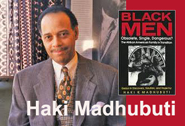 Born in Detroit as Don L. Lee in 1942, Haki Madhubuti’s daring voice, inventive phrasing, and ability to capture the rhythms and sardonic moods of Black speech have made him one of the two or three most imitated black poets in America. Now a professor of English at DePaul University in Chicago, he was, for over 20 years, an associate professor of English at Chicago State University, and, with Gwendolyn Brooks and Richard Wright, has had perhaps the most important impact on Black writing from Chicago. His many volumes of poetry include Don’t Cry, Scream (1969), Killing Memory, Seeking Ancestors (1987), and Groundworks: New and Selected Poems of Don L. Lee/Haki R. Madhubuti, 1966-1996. He also edited the highly influential 1971 anthology Dynamite Voices I: Black Poets of the 1960’s, a celebration of the black arts movement of the 1960’s, of which he was a major figure. But Madhubuti’s influence has extended far beyond his writing. As editor-publisher of Chicago’s Third World Press, director of the Institute of Positive Education, founder of the Gwendolyn Brooks Center, and fierce crusader for independent black institutions his impact on the cultural unity and social, psychological, educational, and economic vision of black people in America and throughout the world has been enormous. Among his books speaking directly to such issues are Enemies: The Clash of Races (1978) and African Centered Education: Its Value, Importance and Necessity in the Development of Black Children (1994). Even without the help of a major national distributor, Madhubuti’s books have sold more than a million copies.
Born in Detroit as Don L. Lee in 1942, Haki Madhubuti’s daring voice, inventive phrasing, and ability to capture the rhythms and sardonic moods of Black speech have made him one of the two or three most imitated black poets in America. Now a professor of English at DePaul University in Chicago, he was, for over 20 years, an associate professor of English at Chicago State University, and, with Gwendolyn Brooks and Richard Wright, has had perhaps the most important impact on Black writing from Chicago. His many volumes of poetry include Don’t Cry, Scream (1969), Killing Memory, Seeking Ancestors (1987), and Groundworks: New and Selected Poems of Don L. Lee/Haki R. Madhubuti, 1966-1996. He also edited the highly influential 1971 anthology Dynamite Voices I: Black Poets of the 1960’s, a celebration of the black arts movement of the 1960’s, of which he was a major figure. But Madhubuti’s influence has extended far beyond his writing. As editor-publisher of Chicago’s Third World Press, director of the Institute of Positive Education, founder of the Gwendolyn Brooks Center, and fierce crusader for independent black institutions his impact on the cultural unity and social, psychological, educational, and economic vision of black people in America and throughout the world has been enormous. Among his books speaking directly to such issues are Enemies: The Clash of Races (1978) and African Centered Education: Its Value, Importance and Necessity in the Development of Black Children (1994). Even without the help of a major national distributor, Madhubuti’s books have sold more than a million copies.
In 1990 he published Black Men: Obsolete, Single, Dangerous? Here his focus is on the problems with, and hopes for, “Afrikan American Families in Transition,” as part of his subtitle reads. The book is a compendium of analysis, advocacy, and memoir sprinkled with poems, and list after list—like “The Five Most Often Used Excuses Black Men Give to Black Women,” “200 Books All Black People Should Study,” “Twelve Secrets of Life.” There are chapters on food and marriage, and—among much advice directed towards black men—a chapter called “Before Sorry: Listening to and Feeling the Flow of Black Women.” When I put together my book Black Writing from Chicago: In the World, Not of It? I used selections from this book. In “Never Without a Book,” the prefatory essay to his list of 200 books, he tells us that from 1961 to1966 his “study regiment…was to read a book a day and write a 150 to 200-word review of the book.” Such intensity and determination, matched with a unique personal grace, runs not only through his writing but also through his relationships with others.
He was very gracious to me when I lost my youngest son, Bryan Emmanuel, who died in 2006, aged 21 years. And I had Haki in mind primarily when I used the question “In the World, Not of It?” as the second half of the title of Black Writing from Chicago, a book I also dedicated to him. No one can deny that Madhubuti is fully in the world, but he has steadfastly separated himself from being of the world—that is, the mainstream world, a world rife with racism and full of values that, in his view, tear down the family, the human, and in particular the black man. If black men, he says, don’t turn away from racist, white-based values to more African-centered values, they run the risk of becoming obsolete, embracing singleness, and being indelibly identified with danger—a process already fully underway, a process he has spent a life-time trying to reverse.
√ Go to a list of Black Writers written about on this site, OR the Teaching Diversity main page.